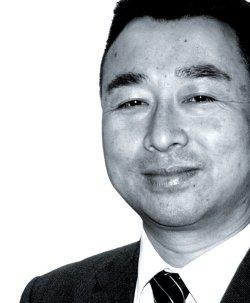Executive Interview -- Verizon Business Executive Officer & President, Itsuo Iso.
One of the biggest players in the global IP industry is Verizon Business, a unit of Verizon Communications. With 321 offices in 75 countries and a global footprint that provides more than 2,700 cities with secure network connectivity, Verizon operates the world’s most connected public IP network for multinational and government clients worldwide.
Created after the merger between MCI Inc. and Verizon Communications Inc. in 2006, Verizon Business integrates advanced IP communications and information technology (IT) products and services. The network operates at speeds of up to 40 gigabytes per second (Gbps), the fastest currently available, and Verizon recently conducted the industry’s first field trial of a 100 Gbps optical transmission with a target date of late 2009.
 Itsuo Iso
Itsuo Iso
More recently, Verizon Business became the first company on the market with the Trans-Pacific Express submarine cable network connecting the US with mainland China, South Korea and Taiwan. The new 18,000-kilometer cable system uses the latest optical technology to provide greater capacity and higher speeds to meet the dramatic increase in demand for IP, data and voice communications. The cable can support the equivalent of 77.5 million simultaneous phone calls, more than 60 times the overall capacity of the existing cable directly linking the US and mainland China. The operating capacity of the system—the largest ever built directly between the US and mainland China, South Korea and Taiwan—is 3.2 terabits per second (Tbps), an increase of 25 percent over the original system design.
Japan offers big potential for Verizon Business. Heading up the operations here is Itsuo Iso, 48. Born in Osaka, Iso grew up in Tokyo where he graduated from Musashi Institute of Technology with a degree in industrial engineering. After joining Digital Equipment Corporation, he was sent to the US to work on the Japan sales desk for three years. While there, Iso obtained a Masters degree in Science in Administration from Boston University. Following his 12-year stint at DEC, Iso moved on to work for companies such as Hewlett Packard, Vodafone and Dell. He joined Verizon Business last July.
J@PAN INC: What attracted you to Verizon Business?
Itsuo Iso: I see a lot of dynamics here because the industry itself is changing. It has long been driven by convergences within the telecommunications and IT industries. Now we see convergence with the broadcasting industry, too. For someone like me, coming from the IT industry, that is a challenge.
JI: What do you see as your mission?
II: To grow the business, raise brand awareness and create trust in the Japanese market because we are focusing on corporate clients. The big driving force in Japan is “anshin” or “peace of mind.” That’s very important for this market.
JI: How’s business been?
II: Business is really picking up, and not just our traditional core network business. One of the growth engines right now for us is security. Verizon Business acquired the global information security specialist Cybertrust last year. That acquisition has boosted our ability to provide managed security services to our customers worldwide.
JI: What is the structure of Verizon?
II: Verizon Business is one of three business units of Verizon Communications, and focuses on multinational, corporate and government customers, including 98 percent of the Fortune 500, as well as many Japanese multinational companies.
JI: How competitive is the industry?
II: Our key global competitors are AT&T, BT and Orange Business Services; in Japan and the Southeast Asian region, we also see competition from regionally based companies like KDDI and NTT. But Verizon Business has strength on a global basis and that’s where we see a lot of potential with Japanese multinationals.
JI: How do you market Verizon Business?
II: Since our customer base is pretty much limited to multinationals, it is a high-touch based marketing style. Globally, our name is well known since our global network serves 98 percent of the Fortune 500 companies. The challenge for us is to increase brand name recognition in Japan, which is not as high as we would like, even though we have great credentials.
JI: What is your strategy?
II: Since joining the company, I have spent a lot of time being a spokesperson and increasing brand name recognition and awareness. I have done a lot of media interviews. As I said earlier, “ease of mind” at the corporate level is more important in Japan than in other countries. In Western countries, companies eagerly challenge new technologies and embrace them, whereas in Japan, many companies tend to be really conservative. Consumers always seek hot new sexy technologies, but Japanese corporate customers prefer proven technologies.
JI: How many staff do you have in Japan?
II: We have about 100 people. We have a sales office in Osaka and three data centers. However, we service our customers’ multinational needs with globally-located teams to provide support in local time zones as required.
JI: What is a typical day for you?
II: I get up about 5 a.m. And leave home between 6 and 6:30. Since I live in Saitama, that means a commute of about 90 minutes. I stay here until about 6 or 7. For the first couple of months, I have been mainly in the office and doing PR for the company, but now I am starting to go out and greet customers.
JI: Any weekend work?
II: Sometimes. My Blackberry is always nearby.
Chris Betros is editor of Japan Today.
(www.japantoday.com)





